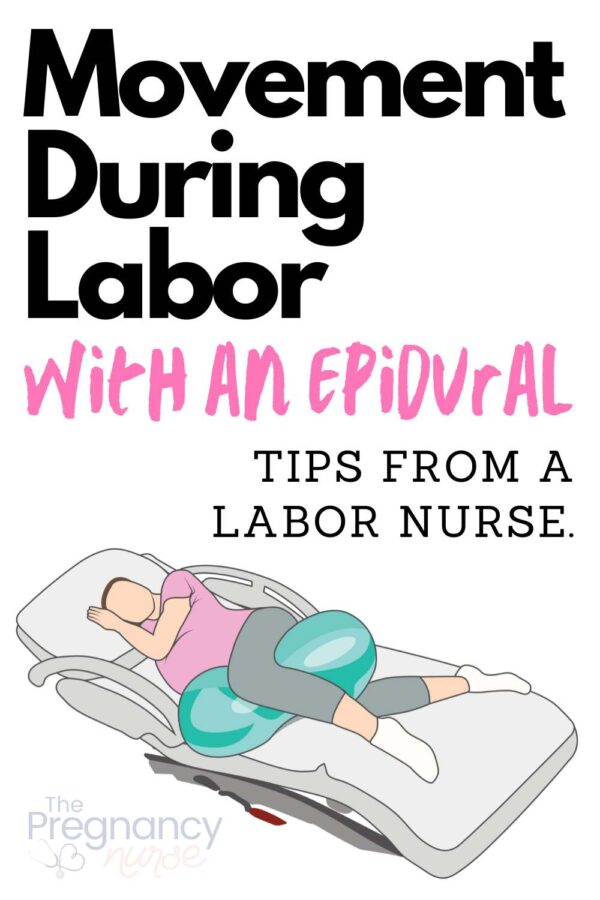📣 YOU are clearly getting prepared for pregnancy, birth & beyond — but do you wish your partner was more involved (looking for a teammate rather than just a cheerleader)? Couples love THIS! 💛🧡💚
The epidural seems to divide a lot of people. Some people love it, some hate it — but what you REALLY need to know is what can you expect from it? Today we’re going to talk about a few side effects a good amount of people experience and are surprised by << it’s SO nice to have that info in advance!

I should quickly mention the difference between a side-effect and a risk. There are side effects of medications and procedures and those are known and tolerable (the ones you’ll read about here). But there are also RISKS to an epidural, and your provider will talk about those with you before they give it.
Before we get going, I wanted to say how happy I am you’re here. I had a couple of these happen to me on my first baby (before I was a labor nurse) and I gotta say I was pretty traumatized by it. If I’d known these things aren’t that unusual it might have helped.
👩❤️💋👨 A lot of people get themselves prepared through articles like this — but are left wondering how to prepare their partner. I recommend this. 💝
Ok, onto those unexpected side effects with the epidural:
👩⚕️ Blood Pressure Drops
Pregnant people don’t talk about this one much, but labor nurses are well aware this could be an issue for you. To prevent it, we try to get a full liter of IV fluid in you prior to getting the epidural.
It’s caused as all your body relaxes as the pain goes away and then your blood pressure drops.
It’s easily remedied by more IV fluids or medications from anesthesia — but it can be disconcerting.
This happened to me on my first baby. I felt ringing in my ears and then thought I was going to die. I mean, your body DOES think you’re dying because blood pressure is pretty important, but it was resolved really quickly.
It’s just something to be aware of.
Pro tip: Patients can feel the blood pressure drop before the nurse can find it with the blood pressure cuff, so if you feel “off” (sometimes it’s a weird sign like ringing in your ears) let them know so they can start treatment ASAP.
Fun Facts: We’ll take your blood pressure about every 2 minutes for the first little bit after the epidural is in to monitor for stuff like this.
Interested in blood pressure — you might like these posts:
- Placenta Power: 7 facts about this amazing organ!
- What Does Having an Epidural Feel Like?
- 10 Possible Ways To Increase Blood Flow To Baby During Pregnancy
- Can I Refuse An IV During Labor?
- Preeclampsia Signs, Symptoms and Treatment
😲 Shaking
Many people get shaking after the epidural. It can be from the meds, or sometimes the cold fluid running near your spinal column (we’re not exactly sure why).
The best thing to do is just to deep breathe and try not fight it. I always tell patients to just go with it. Sometimes a warm blanket will help you relax too.
That’s right I said a WARM BLANKET — did you know most hospital units have a “blanket warmer” that can help you warm up and relax. They’re magical, one of the BEST things in the hospital (although the bar is low). 🙂
If it’s really bad, we sometimes have medications we can give to help it.
Pro Tip: If you find yourself uncontrollably shaking — try sticking your tongue out. A lot of patients find this helps their body chill out (no idea why).
While we’re here, if you’re in that last trimester (or close to it): grab my 3rd trimester checklist:
🤒 Small Fever
Some people get a small rise in their temperature. I wouldn’t call this a FEVER but it does raise a bit (shouldn’t go above 100F degrees).
Again, they think that it’s due to the cold fluid going near your spinal column so your body reacts to raise your whole body’s temperature.
It may cause that shaking I mentioned above, and it can make your hot/cold sensors a bit off.
Other medications like Cytotec can also cause a small temperature too.
LOVE to know the things no one talks about? This is chock-full of them. You won’t want to miss it!

🤢 Nausea
Some people get nauseated. It can happen due to the blood pressure drop I mentioned above, but some people don’t react well to the meds.
OR some people are just nauseated during labor and they suddenly notice it more because they’re not in pain too.
If you’re feeling nauseated, let your nurse know. Most providers already have an anti-nausea drug already ordered for you that we can easily give and help you, hopefully, feel better (there are a couple of them — Zofran and Phenergan, so if one isn’t working ask them if they can try the other one).

🦟 Itching
Some people itch with the epidural. It’s a reaction to the medications used. If you find yourself itchy tell your nurse. There are medications we can give, but often they make you sleep — so just FYI.
Pro Tip: One of my favorite things for mild itching is to give patients a dry washcloth from the hospital. They’re a little scratchy and it is better than digging your nails in. I find it works better than even a wet washcloth (although I often give both).
Most often this itch goes away with time too as your body gets used to the drugs.
Want to know more labor tips — check out these posts:
- How is a Foley Catheter Used in Labor?
- Does Evening Primrose Oil Induce Labor?
- 3 Proven Labor Secrets You Don’t Want to Labor Without!
- Hospital Policies You Can NOT Say No To.
- How to Push-Out a Baby
💉 Numbness
This one sounds sort of silly, but sometimes people aren’t really expecting how numb they feel. Often providers give a large amount of medication at the beginning which numbs you a bit more than you’ll be numbed later. You may also lost movement from the bra line down (aka you can’t move your legs).
As a nurse I love this because it’s a great time for you to take a nap and really relax (and hopefully let baby drop into your pelvis).
Once that initial bolus wears off, you often get more feeling back. If you don’t like how numb you are, you can always ask your nurse to back off the epidural. This will allow you to move more freely.
I talk more about that in my post on the walking epidural (no, you probably won’t walk but you can have more movement).
If there’s something you don’t love (even if it’s something that seems silly like being “too numb”) don’t hesitate to ask. We can’t read your mind and we really do want to help out!
Honestly, knowing what to expect with something during labor (like numbness with the epidural) makes it a LOT more scary. I talk you through how to relax with the weird things going on during labor in the hospital in here. It really prepares you (unlike a lot of classes that will only talk about natural pain management).
Looking to get prepare for your birth? I have some easy options for you!
~~~~~~~~
– Worried you’re missing something? Grab my pregnancy planner so you don’t miss a thing!
– Thinking about an induction? Grab Inductions Made Easy to feel prepared in just 20 minutes!
– Wondering how to get that baby OUT? Grab Going Into Labor Made Easy so you know how to (and not to) do it!
– Postpartum got you anxious? Check out Postpartum Care Made Easy so you can stay SAFE even when all your attention is on that little on.
🚨 AND if ALL OF IT has got you on edge The Online Prenatal Class for Couples is perfect for you — You’ll feel so ready before you even know it!
~~~~~~~~
No matter WHERE you are at in your pregnancy journey, we have resources that can help!
👀 Back Pain Later?
Now, I opened up my Facebook group for people to tell me weird things they experienced with the epidural and everyone came back with back pain afterwards.
I have to say that studies don’t support this. When they compare people who DID get an epidural to people who did NOT get an epidural (both of them had vaginal deliveries though), they found that after the initially healing stage (where your back will be bruised from the needle going in) there was no increased back problems in those who had the epidural.
I have a whole post on back pain after the epidural where I link to the studies and more info.
I think we need to remember that pregnancy and having a baby (along with carrying that baby and breastfeeding) does a LOT to our backs, so things are definitely different after that baby is out. But if you have ANY concerns about that talk with your provider and your anesthesiologist to learn more about the risks.
Smart idea to get a physical therapy appointment postpartum to just have them evaluate your body and see how things are healing up (I recommend this for anyone having new aches/pains postpartum).
I know there was a LOT that I was afraid to ask about which left me worried and concerned with my first baby. BUT, I learned that being prepared, and asking questions were my best line of defense for those types of issues.
When you’re ready to get prepared, come join me in The Online Prenatal Class for Couples. You may be thinking it’s too late for you to get it in, but it really only takes a few hours, and since it’s on-demand you can easily put it into your regular day and you’ll be prepared before you know it!
Want to do a vibe check before diving into the whole thing with me? — check out my free labor pro tips. It’s your first step toward getting in the driver’s seat of your birth.
This is part of my Complete Guide to Epidurals — so if you have more questions don’t miss that!
This post also comes in video form if you’d prefer (be sure to follow me for more great pregnancy-related content!):







 How to Sit in an Office Chair During Pregnancy
How to Sit in an Office Chair During Pregnancy
